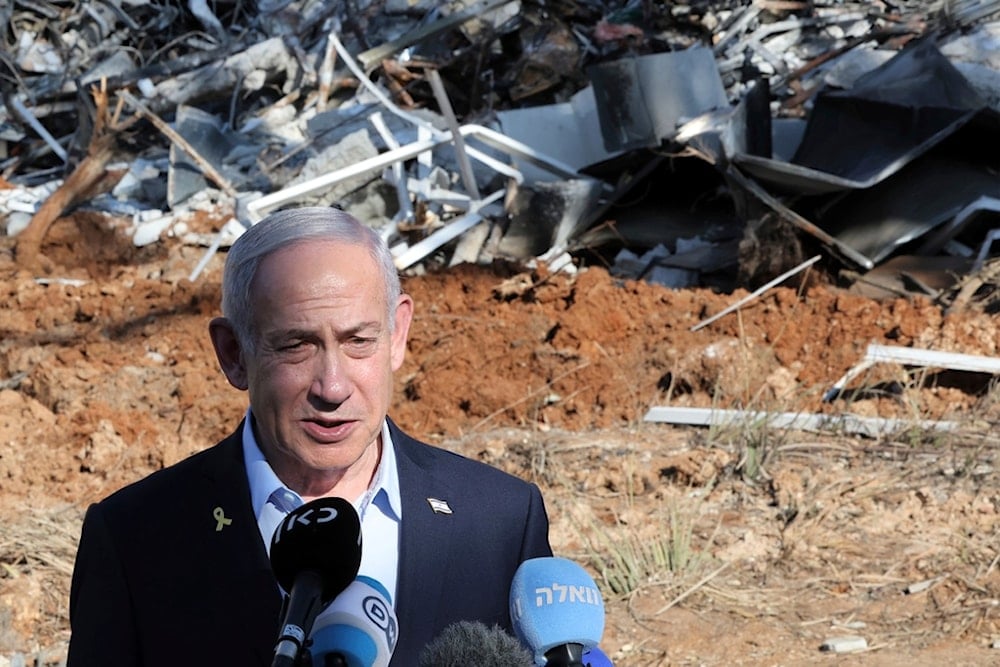Netanyahu allegedly signals readiness to end Gaza war in first
Netanyahu hints at ending Gaza war as US and "Israel" pursue a normalization deal tied to a ceasefire and a prisoner exchange.
-

Israeli Prime Minister Benjamin Netanyahu gives a statement during a visit to the site of the Weizmann Institute of Science, which was hit by missiles fired from Iran, in the central settlement of Rehovot, occupied Palestine, on Friday, June 20, 2025 (AP)
For the first time since the start of the war on Gaza, Israeli occupation Prime Minister Benjamin Netanyahu is signaling interest in bringing the military campaign to a close, according to Israeli media claims.
The shift comes as the Israeli occupation and the United States turn their focus toward a new phase in regional politics, which includes normalization deals and a strategic reshaping of the Middle East.
According to the Israeli Channel 12, Netanyahu has begun sending signals that he is seeking to end the war, but only “on terms that Hamas will not accept.” The report suggests that Netanyahu is now eager to travel to Washington to finalize the details of what is being framed as a post-Gaza political realignment.
Netanyahu has repeatedly claimed throughout the war on Gaza that military victory is within reach and that only through continued pressure can "Israel" achieve what he described as "lasting security."
This narrative has been a cornerstone of his political messaging for years, often used to justify prolonged military campaigns and deflect criticism. Now, as he signals a possible end to the war, many observers caution that it could be yet another strategic bluff, meant to ease US pressure, delay ceasefire terms, or reframe the narrative around normalization and political gain, all while maintaining the illusion of control.
Gaza ceasefire path to regional normalization
The channel cited both Israeli and American sources claiming that “the big goal now is a new Middle East,” one that passes through a ceasefire in Gaza, a potential prisoner exchange deal, and normalization with additional Arab states. Netanyahu’s camp, however, maintains that the current terms being discussed do not meet the conditions demanded by “Israel,” particularly regarding security and demilitarization in Gaza.
Israeli Strategic Affairs Minister Ron Dermer, a close Netanyahu confidant, is expected to travel to Washington on Monday to prepare for the prime minister’s visit, potentially scheduled for mid-July. Dermer will hold talks with senior US officials on topics ranging from ending the war to prisoner negotiations and even conditions for future US-Iran diplomacy.
Mission in Gaza complete, IOF claims
Channel 12 military correspondent Nir Dvori reported that the Israeli occupation forces are expected to inform the war cabinet this week that they had fulfilled their operational objectives under Gideon's Chariots, the military campaign waged on Gaza, and will call on the political leadership to decide the next step.
Meanwhile, an exclusive security meeting is scheduled for Sunday to focus on the latest mediation efforts to secure a prisoner exchange. Political correspondent Yaron Avraham noted that heavy pressure is being applied by mediators, especially in Cairo and Doha, to bring Hamas and the Israeli regime closer to a final deal.
Trump raises expectations amid stalled talks
US President Donald Trump is also stirring optimism, reportedly expressing hope that a ceasefire agreement could be reached this week. While no concrete breakthrough has materialized, Trump’s comments have heightened expectations among the families of Israeli prisoners, according to Channel 12.
Despite the public optimism, sources in Tel Aviv told the channel that there has been no real progress with Hamas thus far. Instead, US officials are promoting the idea of a comprehensive agreement that would secure the return of captives, end the war, and unlock regional diplomatic gains.
As part of these efforts, the Israeli regime reportedly responded two weeks ago to a proposal via the Witkoff framework by offering some flexibility on the timeline for prisoner releases. However, Hamas has yet to issue a formal reply.
Netanyahu, US clash on deal
Despite Washington’s preference for a single unified deal, Netanyahu remains committed to a phased release of captives, according to the existing Witkoff outline. Under this plan, captives would be released in two stages, with a full ceasefire coming only after an agreement is reached on the conditions for ending the war.
Channel 12 emphasized that while there was a convergence of interests between Washington and Tel Aviv regarding the final outcome, significant gaps remain over timing, guarantees, and sequencing, which are set to be discussed during Netanyahu's upcoming White House visit.
Meanwhile, US President Donald Trump stated on Friday that a ceasefire in the Gaza Strip could be reached within the coming week. "We think within the next week, we're going to get a ceasefire," he told reporters.
Israeli newspaper Israel Hayom revealed that Trump was allegedly applying "heavy pressure" on Netanyahu to halt the war on Gaza.
Hamas agrees to Witkoff proposal
Hamas announced in late May its approval of a new ceasefire proposal presented by US envoy Steven Witkoff, marking a potential breakthrough in efforts to halt the ongoing Israeli aggression on the Gaza Strip.
In an official statement, Hamas said the proposal outlines a general framework that includes a permanent ceasefire, a full withdrawal of Israeli occupation forces from the Gaza Strip, the immediate entry of humanitarian aid, and the formation of a professional committee to administer the enclave’s civil affairs upon the formal announcement of the agreement.
The statement further noted that the deal entails the release of ten Israeli captives, along with the return of several bodies, in exchange for an agreed-upon number of Palestinian detainees, under the supervision of international mediators.

 5 Min Read
5 Min Read









